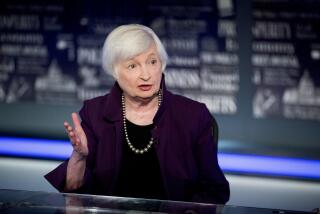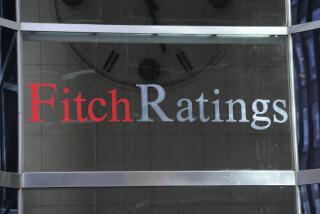Asia: Moodyâs downgrade infuriates the government, which had protested the action.
TOKYO â The worldâs second-largest economy suffered a deep psychological blow Friday when its credit rating was slashed two notches by Moodyâs Investors Service, which said Japanâs debt levels are approaching âuncharted territory.â
The countryâs yen-denominated government bonds, in theory, now are less credit-worthy than those of Botswana, Chile and the Czech Republic, and on par with Poland and Cyprus.
It was the latest economic embarrassment for Japan, which little more than a decade ago seemed invincible, its corporate titans snapping up Hollywood studios and prime U.S. real estate at premium prices.
These days, the dominant headlines are about rising unemployment, bankruptcies, bad loans and politicians too weak-willed to do anything to correct the course.
Nevertheless, Japanâs financial markets largely took the expected news in stride. The Nikkei-225 stock index eased less than 0.1%. The yen, which has been surging against the dollar in recent weeks, was little changed until the Bank of Japan stepped in again to try and weaken the currency. It fell in New York trading to 124.38 per dollar from 123.05 Thursday.
The Moodyâs downgrade took Japanâs yen-denominated securities to A2 from Aa3, affecting $5.4 trillion of debt. Moodyâs left Japanâs foreign-currency bonds rated Aa1.
The move by the U.S.-based rating firm infuriated the Japanese government--which had taken the rare step of protesting the anticipated action before it happened Friday. It was Moodyâs second downgrade of Japanese securities in six months.
The Finance Ministry blasted Moodyâs. âTheyâre only concerned about the direction of a country, but the purpose of the rating is to measure default risk, and if you consider that, the ratingâs not appropriate,â said spokesman Masaki Omura.
Prime Minister Junichiro Koizumi blamed Moodyâs for causing Japanese âto begin to lose confidence in themselves.â He contended that the rating shows only part of the picture, neglecting Japanâs âstaying powerâ and economic fundamentals.
âIf you look at the ratings given by those same ratings agencies to Latin American countries and African countries--the same countries that Japan is providing assistance to--Japanâs rating has gone below the ratings for some of these countries,â Koizumi recently told reporters. âHow is that possible?â
Indeed, the rating does seem somewhat ironic. Japan remains by far the largest net creditor country in the world, whereas the U.S. is a net debtor. And Japan still sits on the worldâs largest pile of savings.
Moreover, most economists think the possibility of default--which is what the credit rating is supposed to grade--is minute.
âThe likelihood of Japan missing a debt payment is virtually nil,â said Robert Feldman, economist at Morgan Stanley Dean Witter.
Even Moodyâs said it âassigns a very low probabilityâ to a default. Japanâs large pool of household savings, the ability of the banking system to absorb substantially higher levels of government debt, and the small scale of the governmentâs exposure to foreign creditors should avert any such possibility, Moodyâs said. All but about 5% of Japanese bonds are held by domestic investors, versus one-quarter to one-third of bonds in countries such as the U.S.
But Moodyâs was taking aim at Japanâs broad economic direction. âJapanâs general government indebtedness, however measured, will approach levels unprecedented in the postwar era in the developed world, and that as such Japan will be entering âunchartered territory,ââ it said in a statement.
Japanâs debt stands at about 140% of its output, or gross domestic product.
In theory, at least, the lower credit rating should mean that prices of government bonds should drop and, correspondingly, interest rates rise. But Japan often doesnât function like a normal market economy. Despite the comparatively low credit ratings, its interest rates are among the lowest in the world.
Moreover, domestic investors have few attractive options about where to invest: The stock market is one-third of its value 10 years ago, real estate values have plunged, and investing overseas presents substantial foreign-exchange risk.
Hence, investors stick with government bonds. âThe fact that the economy offers such bad alternatives to government bonds only indicates how broken the system is,â said economist Feldman.
More to Read
Inside the business of entertainment
The Wide Shot brings you news, analysis and insights on everything from streaming wars to production â and what it all means for the future.
You may occasionally receive promotional content from the Los Angeles Times.







